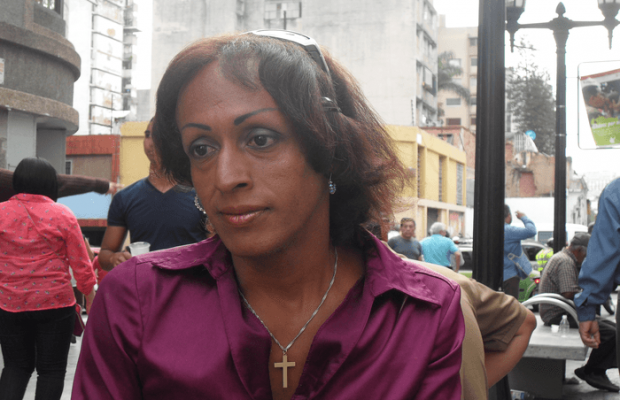Chavismo's LGBT Problem



Rummie Quintero was supposed to be Chavismo’s first ever transgender candidate, but the PSUV-GPP coalition said no.
A couple of weeks ago, CC fellow blogger Audrey M. DaCosta wrote about Tamara Adrian, Venezuela’s fist-ever transgender candidate for public office. Her story made headlines and shone a much needed spotlight on the LGBT agenda in Venezuela. Now, thanks to Chavismo’s handling of their own gay and transgender candidacies, Adrian’s run for office has also given the opposition coalition (MUD) an edge in shaping the debate around this issue, and courting the LGBT electorate during the upcoming campaign.
Adrian’s candidacy has caused serious frictions in Chavismo’s LGBT community, after three transgender candidacies from within the PSUV-GPP coalition’s base were ultimately left out of their final electoral roster.
Although PSUV held primaries back in June, and allocated candidacies accordingly, several spots on the party list were promised to GPP, a coalition of minority parties and social movements loyal to chavismo. Hoping to fill some of these spots, and assured by Nicolás Maduro’s public demonstrations of support, pro-government LGBT organizations held a special primary to select gay and transgender candidates for the PSUV-GPP ticket. 4.780 people voted.
In an interview with Tal Cual, Leandro Viloria, member of the Ejercito Emancipador Revolucionario group and one of the three winners of this LGBT primary, says that his candidacy was vetoed by PSUV campaign chief Jorge Rodríguez, who refused to even meet with him to discuss his claims. Rummie Quintero, a transgender activist also elected via LGBT primaries, says that PSUV and GPP are playing the blame-game with each other as a means of buying time and dodging the issue until it’s too late.
Neither Viloria nor Quintero nor Luis Marchant, the third primary winner, were finally included in Chavismo’s grand coalition.
In answering to Maduro’s forceful insistence that Chavista candidates will represent everyone regardless of their sexual orientation, Viloria complained that “there was no diverse representation within the revolution” and that their movement “…lost a battle inside the PSUV against homophobia”. In his interview with TalCual, Viloria suggested that pressures from Evangelical Churches that are closely allied with Chavismo could be a key factor in this case.
Rummie Quintero recognizes that Tamara Adrian’s candidacy is an important breakthrough for the transsexual community in Venezuela and asks the PSUV-GPP alliance for “…a strong response”. But Viloria has dismissed Adrian’s candidacy and what she can actually achieve if elected:
“If Tamara Adrian wants to propose (same-sex marriages), that will be vetoed because it comes from the opposition. Every single bill that the opposition proposes, will be vetoed.”
Sadly, in this case, political differences trump the the fight for a joint cause.
In addition to Adrian, the MUD’s roster of candidates also includes gay-rights activist and political prisoner Rosmit Mantilla among its hopefuls. That’s two more than PSUV-GPP’s zero. And while this by no means represents a victory for LGBT representation in the Venezuelan political sphere, its a good step in the right direction. It also makes PSUV seem intolerant by comparison, something the MUD should smartly use to their advantage in presenting a more progressive image to the electorate and perhaps even winning over some detractors.
Chavismo has struggled to portray itself as a unitary front for the December 6th elections by crushing all forms of internal dissent in the process. This is just the latest episode in a long list to be aired in public. Their so-called “perfect alliance” isn’t what they want people to believe.
Caracas Chronicles is 100% reader-supported.
We’ve been able to hang on for 22 years in one of the craziest media landscapes in the world. We’ve seen different media outlets in Venezuela (and abroad) closing shop, something we’re looking to avoid at all costs. Your collaboration goes a long way in helping us weather the storm.
Donate




